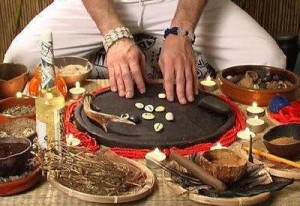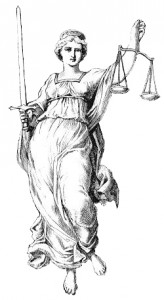 A young lawyer who sometimes invited me to his trials told me a few days ago about something unusual that happened in the Territorial Military Court in San Jose de las Lajas, to the south of Havana, where some Santeros filled the judges’ stand with dust, seeking a favorable result for their relatives, implicated in serious crimes. His client didn’t contract for the services of any witch, but received an unexpected penalty just like the other defendants.
A young lawyer who sometimes invited me to his trials told me a few days ago about something unusual that happened in the Territorial Military Court in San Jose de las Lajas, to the south of Havana, where some Santeros filled the judges’ stand with dust, seeking a favorable result for their relatives, implicated in serious crimes. His client didn’t contract for the services of any witch, but received an unexpected penalty just like the other defendants.
The criminal attorney assumed that the decision was influenced by the discomfort of the judges before the trail of dust and other signs of witchcraft. On noticing “the work” the Head of the Chamber ordered the Registrar to find a cloth to “sweep away the trash.” The tension of the oral hearing with the interventions of the prosecutor, witnesses, the accused, the defense and the arbitration by the judge were warmed by the challenge of the alleged curse.
 A friend notes that this is more common than many assume. Some believe that the engagement of a palero, a Santeria practitioner, can reverse the outcome of the trial and “soften the prosecutor’s proposal, tie the tongue of the attorney if his client is on the opposite side, or put into the mouth of the judge the orders of the “pot,” linked to the dead who assist the practitioner, who speaks with them through a complex system of divination that passes through the interpretation of the snails and the feeding of animals like a rooster, goat or sheep.
A friend notes that this is more common than many assume. Some believe that the engagement of a palero, a Santeria practitioner, can reverse the outcome of the trial and “soften the prosecutor’s proposal, tie the tongue of the attorney if his client is on the opposite side, or put into the mouth of the judge the orders of the “pot,” linked to the dead who assist the practitioner, who speaks with them through a complex system of divination that passes through the interpretation of the snails and the feeding of animals like a rooster, goat or sheep.
Although there are naive and opportunistic, the “godchildren” of paleros, santeros and babalawos believe in the power of those called on, the strength of the dead and the details of their own magical religious conception, which leads them to “throw the judges, the lawyer or the prosecutor” after exploring the possible sentence, so that sometimes, when passing by a ceiba tree or at the door of their houses, these powers of the law face signs of witchcraft.
 The defense attorney doesn’t worry about “the mess in the pot” because he believes that every trial is a theatrical performance under pressure from above, through money or the police they invoke “secret operational tests” that complicate things for the accused, leaving the defense at a disadvantage, unless the Head Judge, committed to fairness, disregards the testimony of those in uniform.
The defense attorney doesn’t worry about “the mess in the pot” because he believes that every trial is a theatrical performance under pressure from above, through money or the police they invoke “secret operational tests” that complicate things for the accused, leaving the defense at a disadvantage, unless the Head Judge, committed to fairness, disregards the testimony of those in uniform.
He says that a few weeks back, a babalawo who got someone accused of molesting his stepdaughter out of jail, went through his house and instead of thanking him, told him he owed his freedom to Orula and Olofi, gods from the Yoruba pantheon, who advised him what to do during his confinement.
The faces of error of such a peculiar way of influencing justice are evident also in the Havana Provincial Court, where sometimes they have to dust off the stands and remove “other gifts” intended to appease judges, prosecutors and lawyers. According to the defense attorney friend, if anyone benefits it’s the family of the victim since the judges are not impressed and issue judgments without thinking about the anger of the dead or the power of Oshun, Yemaya and Orula.
